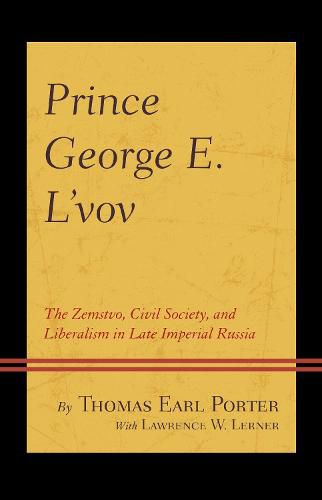Readings Newsletter
Become a Readings Member to make your shopping experience even easier.
Sign in or sign up for free!
You’re not far away from qualifying for FREE standard shipping within Australia
You’ve qualified for FREE standard shipping within Australia
The cart is loading…






Prince George E. Lvov was born in Dresden in 1861, the same year Tsar Alexander II emancipated the serfs and Russia began to move away from its static society of orders toward a more modern polity. He died in exile in Paris in 1925 with Russia once again in thralldom. Prince L'vov dedicated his life to the improvement of the peasantry’s condition and, like many other liberals, hoped to acculturate them to the norms and values of a civil society to attempt to overcome the backwardness of provincial life and ultimately to integrate them as ‘citizens into a modern, vibrant nation. L'vov played an important role in Russia’s first experiment with local self-government, oversaw the Great Migration of thousands of peasants to settle the wilderness of Siberia free from anyone’s tutelage, organized aid to the tsar’s peasant soldiers in the Russo-Japanese and First World Wars and helped to marshal the resources of the nation and coordinate industrial production during the latter conflict. It was precisely because of this lifetime of dedicated public service that he was chosen as liberal Russia’s standard bearer upon the collapse of the Romanov dynasty. But the few references in the scholarly literature concerning Prince George L'vov are invariably negative ones which fault him for his weak and ineffectual performance as the first head of the Russia Provisional Government in 1917. That the Provisional Government failed is, of course, incontrovertible, though much of the blame rightly should be, and generally is, laid at the feet of his successor. Of course, it must also be allowed that the social revolution developed and then deepened during L'vov’s stewardship of Russia. Equally unassailable is the conclusion that it was largely that government’s temporizing, whether deliberate or not, which led to its demise. What then accounted for this paralysis and complete failure of Russia’s liberal movement? This book attempts to answer that question by presenting a more balanced appraisal of L'vov’s place in Russian history through an examination of his career as a dedicated public servant.
$9.00 standard shipping within Australia
FREE standard shipping within Australia for orders over $100.00
Express & International shipping calculated at checkout
Prince George E. Lvov was born in Dresden in 1861, the same year Tsar Alexander II emancipated the serfs and Russia began to move away from its static society of orders toward a more modern polity. He died in exile in Paris in 1925 with Russia once again in thralldom. Prince L'vov dedicated his life to the improvement of the peasantry’s condition and, like many other liberals, hoped to acculturate them to the norms and values of a civil society to attempt to overcome the backwardness of provincial life and ultimately to integrate them as ‘citizens into a modern, vibrant nation. L'vov played an important role in Russia’s first experiment with local self-government, oversaw the Great Migration of thousands of peasants to settle the wilderness of Siberia free from anyone’s tutelage, organized aid to the tsar’s peasant soldiers in the Russo-Japanese and First World Wars and helped to marshal the resources of the nation and coordinate industrial production during the latter conflict. It was precisely because of this lifetime of dedicated public service that he was chosen as liberal Russia’s standard bearer upon the collapse of the Romanov dynasty. But the few references in the scholarly literature concerning Prince George L'vov are invariably negative ones which fault him for his weak and ineffectual performance as the first head of the Russia Provisional Government in 1917. That the Provisional Government failed is, of course, incontrovertible, though much of the blame rightly should be, and generally is, laid at the feet of his successor. Of course, it must also be allowed that the social revolution developed and then deepened during L'vov’s stewardship of Russia. Equally unassailable is the conclusion that it was largely that government’s temporizing, whether deliberate or not, which led to its demise. What then accounted for this paralysis and complete failure of Russia’s liberal movement? This book attempts to answer that question by presenting a more balanced appraisal of L'vov’s place in Russian history through an examination of his career as a dedicated public servant.